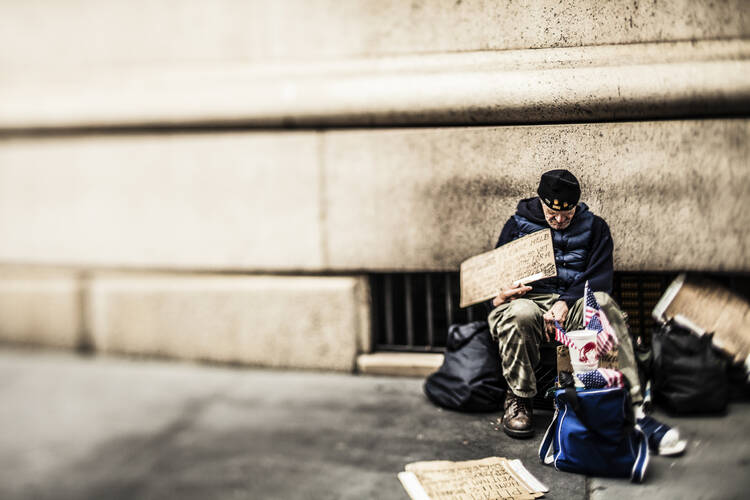The morning 10-minute walk from where I live to the newsstand at 57th St. and 8th Ave.—with Central Park to the north, Lincoln Center to the west and Carnegie Hall looming over it all—is a world in itself. Here even the homeless seem quite at home.
On an average day I encounter seven homeless individuals within 10 minutes. Three men bundle together, head to toe, several layers of filthy blankets pulled up over their sleeping shapes, their bags of junk food and other belongings squeezed against the wall, barely a toe or hand or top of a head exposed to the passing curious. A fourth, equally wrapped, is a few yards away, six feet from a huge mountain of garbage, wrapped in 15 to 20 bulging black or white plastic bags. Three lone men command the intersections, each propped against a corner lamp post, as he displays the standard cardboard scrawled with: VETERAN, MIRACLE NEEDED, BIRTHDAY, $31 FOR BUS TICKET TO PHOENIX ARIZONA, ANYTHING WILL HELP!
This tiny bird, with brownish-grey feathers, dappled with spots of gold and a long, sharp beak, seems to have lost to ability to fly. Otherwise why would he, trembling, skip along against a building on Broadway? In front of me a young man stoops down close to offer the bird a bite from his bagel. But the bird declines to bite. I bend down close, as if the bird might have something to say. But he doesn’t want to talk. Why doesn’t he just fly?
Our neighborhood is being constantly knocked down and built up and up. Now our soaring super-homes scrape the sky with their $100 million suites. Driving in from New Jersey, we see the Empire State Building and Chrysler Building looking like dwarfs on a basketball court.
The subway system floats a campaign to raise the level of civility in the individual cars. A series of cartoon signs above the seats say don’t occupy more than one seat at a time, don’t eat or drink and leave the garbage, don’t tote our bags so they bother others, don’t play loud music, don’t hold the doors and don’t entertain the car by swinging on the poles. At that moment the doors open and four or five young men announce that they will entertain—for money. They play loud music, dance, do flips and summersaults, swing from the poles and take up a collection. In another car a man with a cane and a cup and a loud voice announces that he is homeless, a veteran, jobless, poor, and takes up a collection.
On the subway platform, six women sit in the wooden bench, each bent over, no communication among them, oblivious to their surroundings, totally absorbed with the iPhone in their hands. On the floor toward the end of the bench, a young man in rags, arms spread out, legs twisted, sprawls unconscious perhaps with no sense of where he is or why he is there. I move in close a search for some sign of life. I think I see a slight rising and falling of his chest. There is no policeman in sight. What can I do? My train comes, the doors open, I go.
In Jersey City a man at Journal Square tells me he is hungry. I take him to lunch at McDonald’s and we talk. He is in an addiction program but stopped attending. He has family he never sees. In lower Manhattan I buy a large ham and cheese sandwich in two parts. I will eat one as I walk, the other later. But I see these homeless men everywhere cowering in doorways and offer them my other sandwich. All refuse it.
In the Bronx I’m hurrying to catch a train to get home in time for Mass, when a man in black leaps out on my right side, murmuring something and touches my shoulder. I keep going as if he wasn’t there. Then I pause, What am I doing? Am I like the priest on the way to the temple, passing the man in the ditch, in the parable of the Good Samaritan? What if he needed help? I turn around. He is gone. At Mass I pray for forgiveness.
At Rockefeller Center the workmen dismantle the scaffolding around the Christmas tree in order to hang the lights. A holiday swarm of tourists and local citizens with throngs of little children watch, move, enjoy. What I remember as the usual Salvation Army Santa or Soldier in blue togs ringing a single bell has been replaced. On the south end two young black men in Army blues sing, smile and dance as a combo on either side of hanging bucket. The “song” consists of “carwash, carwash, carwash.” On the north end two Hispanic gentlemen sing and dance around the bucket as well. Like their companions, they radiate joy with every word and step and, unlike their companions, sing a song that does mention Christmas. Parents pass dollar bills to their children, and the little boys and girls run up, put the donation in the pail, and return to their parents with the feeling that they have done something good.








